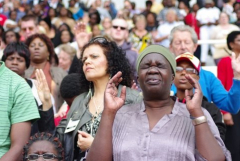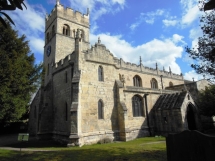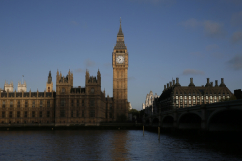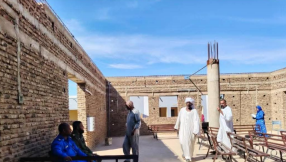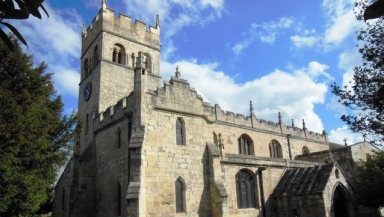
The Church in the UK is in trouble – or at least that's what the headlines tell us. So what does the future have in store for British Christianity? Jason Clark, senior pastor of Sutton Vineyard, oversees and leads church planting in London for Vineyard Churches UK. He spoke to Christian Today about how British churches are looking ahead in a time when the narrative is largely one of decline.
What does the local church mean to you?
I'm an advocate of Bill Hybels' claim – the Church is the hope of the world. I think there's nothing like the local church; it's about Jeremiah 29: "seek the welfare of the city where I have sent you into exile". As Christians, you could say we're in exile in our own country, and we're called to care for the welfare of each other – what makes that possible is when we're seeking God together.
Church is a group of Christians choosing to live as God's people, and invest in their lives in a way that others aren't. Most Christians use church as a means to an end for something else, thinking it's there to help me get through life when it's convenient for me, but it's this idea of belonging to a community of God's people for your wellbeing and for the wellbeing of where you live. That's a vision for the local church that the Bible has for us. I'd say we're going to have to rediscover that, and there are lots of people who already have.
So what's the problem?
One of our biggest problems is that we don't know how to engage with church unless it's useful for us, or helps us get something else out of it. That's how we're trained from birth – is this convenient; do I like it; is it helping me?...We need to recognise that church is there for us, but also find a way to be the church together.
We can't use church as a way to get more of what we've already got; most people think of it as a place help me get great job and a great relationship, but the vision for the local church is what can God bring through us for where we live, and into our own lives at the same time?
What about those that say 'We are the Church' so we don't need to gather together in a building?
It's absolute rubbish. No one applies that to the rest of their lives – you don't say "I am my family but we don't have a building, we don't share meals, I don't sleep there, I don't spend my money looking after it..." there's no logic to that. We don't do it with football, or music and concerts, or hobbies or our families...If the Church is family and fellowship, then surely we should get together as God's people? People also say the idea of preaching is out of date, and they can't remember any sermons from the past 30 years, but you eat every day – do you only eat when you can remember the meals you've had before? Life doesn't work like that in general so we need to stop pretending Church should.
There's a consumerist attitude to church that's destroying it. I'm a firm believer that everyone is deeply religious. Some people work on Sundays, but most people are choosing to do something that they're deeply religious about – so many (mostly middle-class) Christians have taken up marathons, triathlons and cycling in the place of church life – that's their new religion. How much money do they spend on carbon fibre bicycles? How many hours do they spend on their hobbies? And they do it with other people; they pay subscriptions...We are all religious, we're all investing our lives in something. The only question is, what are we investing our lives in?
We're obsessed with lifestyles, and we want the Church to fulfill a way of life when it is a way of life. We're the body of Christ, God's people – the household codes in the New Testament says God's people are to be distinct, to do life together, and to be something for people to look at that they can see living differently in the world, together. It's not something to download on demand.
I've also had people say to me – "Why do I need to go to Church when I can download an NT Wright sermon every week?" And I think, well if everyone did what you did, there would be no NT Wright. He's there because there's a church building with a church community who are paying for him to preach there. If everyone did what you did as a consumer, there would be nothing for you to download!
How important is the local church in the UK, especially in a time of austerity?
I'm always hesitant about this, because usually the people listening are thinking: "What can the Church be doing that I can't be bothered to do myself?", whether they are Christians or non-Christians, and I have no interest in pandering to all those people who want nothing to do with church but want to tell it what it should be doing. The Church should be being Church; being faithful to God, doing life together, helping one another as we help the world around us...now more than ever we need to be worshipping as God's people.
What do you make of the idea that Christianity is in decline – is the local church suffering?
Yes. I keep an eye on the statistics, and some of the most recent ones show that the Church in the UK has grown overall, but it is people who are engaged in church who are not white and middle-class. So ethnic and immigrant churches are one area of growth. Another is fresh expressions, which have added the equivalent of a diocese across the UK which is fantastic. But the Church is still in decline, and I don't know if that will continue. While, statistically middle-class white Christians would rather be doing something else than be engaged with Christianity with others – [there's an attitude of] "it doesn't work for me anymore, church has hurt me, bored me, is inconvenient for me, doesn't meet my needs etc... so I can't be a part of it."
So what needs to change, the Church or people's attitudes?
It needs to come from both, or somewhere in between. I have a strong feeling that there's a whole bunch of people who left the Church and have justified leaving for the most banal reasons. There is an opportunity to recognise that they are part of the problem; it's so easy to say "I hate the Church, I've been hurt by it", but you write or talk about how wonderful the Church is and everyone thinks you're naïve. There's a victim mentality out there that makes it easy to demonise the Church.
On the other end of things, the Church has got to face up to its situation and make changes – significant ones. But I've met hundreds, even thousands, of church leaders and members and most I know are people whose churches are trying very hard to change and be relevant. I think the perception that the Church is out of touch isn't true; I could list hundreds of people who are the most wonderful people and trying so hard to live this out, and want their churches to be more engaged with God and to transform society.
I wonder if the greatest change would come if all those Christians who have given up on church and say they want nothing to do with it, woke up tomorrow and decided to be part of the solution. If they said I'm going to find my nearest church which offends me the least, and I will be the one person, even if it's just me, who serves, gives and worships – that would probably be two to three million people. What would that do for the Church and the UK? If those three million made that decision, it would transform the Church.
Jason Clark is speaking on the 'Future of the local church' at the Future Conference on June 22. Hosted by the London School of Theology, it will look at the future of faith in the UK and include a number of short talks by speakers including Professor of Evangelism at Drew University, Leonard Sweet, and Aaqil Ahmed, head of Religion & Ethics at the BBC.
More information and tickets here.
This article has been updated to include more up to date information from Fresh Expressions.










